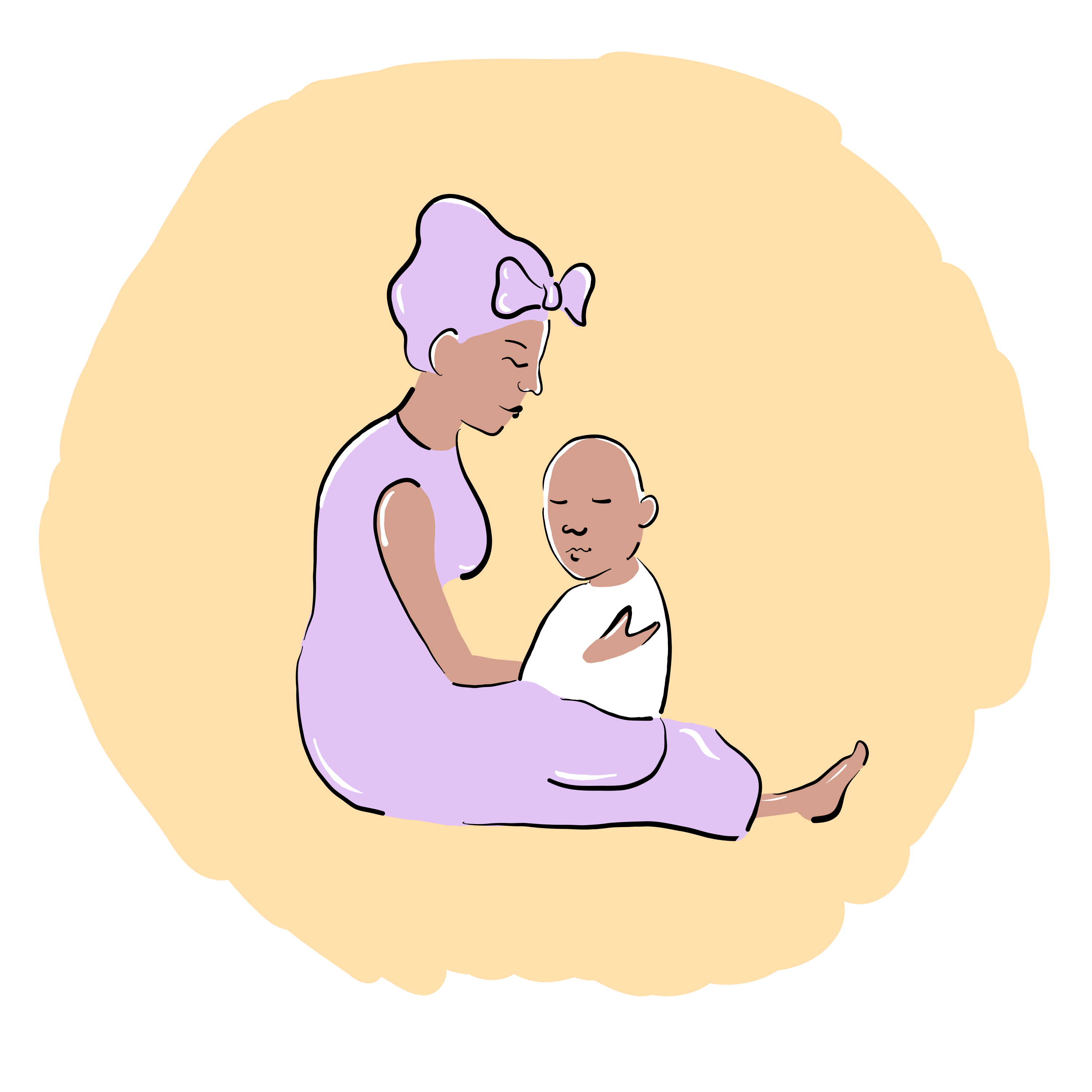Stories
Discover their stories
Our Members and Beneficiaries
Funny Lazaro
09/04/2019
Born on 24th of July 2015, Funny Lazaro was the first child born to Mr and Mrs Lazaro of Tchewerani village T/A Katumura Madisi in Dowa District. Her mother, Stella Cosmas, 19 at the time…
Meet
Funny Lazaro
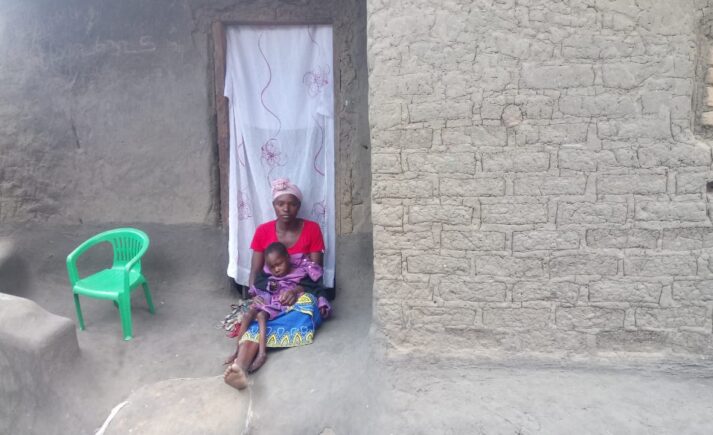
Born on 24th of July 2015, Funny Lazaro was the first child born to Mr and Mrs Lazaro of Tchewerani village T/A Katumura Madisi in Dowa District. Her mother, Stella Cosmas, 19 at the time of pregnancy, had attended all her antenatal visits in readiness for her newborn baby girl.
When she was due to give birth, she went to Madisi Mission Hospital. At exactly 8PM, Funny was born, a bouncing baby girl. However, despite the efforts of the midwife, Funny did not let out her first cry. The mother and baby stayed at the hospital throughout the night and finally, Funny cried for the first time the next day around 4AM in the morning.
A few days later, they were discharged from the hospital. When they were about to leave, Funny started crying uncontrollably. They were readmitted but the child did not stop crying till the next day. When the doctors noticed that the condition was worsening, they referred them to Dowa District Hospital. The decision was then reversed by other doctors suggesting that Funny should be treated at the same hospital. Her condition improved and she was discharged from the hospital.
Six months later, Stella started training her child to sit down, as any mother would do. She noticed that her child was crying in pain during the session. She took her back to Madisi Mission Hospital for consultation with the doctors, where she was assured that the child was doing just fine and that she needed more time.
Eight months later Funny was still not able to support her neck or stand without help from her mother. She would also still cry whenever Stella tried to make her sit. The concerned mother took her again to Madisi mission hospital.
When she explained the condition of her child, Stella was embarrassed by the doctors claiming that she was too insistent and it was as though she wished to have a disabled child because of her frequent visits to the hospital. She returned home disappointed and without any help.
A year later, in 2016, Funny’s mother decided to visit another hospital for consultation again, because she noticed her daughter’s condition was deteriorating. She went with her child to Kasungu District Hospital. She was sent back home and told that the child was fine because she had a healthy-looking body.
Months passed by and Funny could still not sit up and was always in pain. Her mother always had to carry her on her back. One day Stella decided to visit another hospital, hoping that maybe there she would get the treatment Funny needed.
She was accompanied by her mother. They went to St Francisco Palau commonly known as Mtengowanthenga hospital. She explained all the health issues that her child was experiencing, but again they were not able to help and they went back home disillusioned.
She continued taking care of her child at home without any medical backup. The husband abandoned them and divorced because of the child’s condition. There was no further help from the father, in terms of providing basic needs, even though he knew he left a disabled child behind. The mother was struggling to provide for her child as she was unemployed.
At 4 years old, Funny was still not able to talk, walk or sit down on her own, bringing a lot of concern to her mother. They moved from Madisi Dowa District to Kasungu District at Mbeta village T/A Kaomba. In July 2019, her mother got the courage to go back to Kasungu District hospital. She went straight to the “Malawi Against Physical Disabilities” service. There she was warmly received. For the first time, doctors told her that her child was disabled and born with Cerebral Palsy (CP). The doctors advised her that Funny was expected to come once a month for physiotherapy treatment. By now, Stella had remarried and was expecting a second child very soon. Since she had to carry Funny on her back whenever she left home, it was difficult for her to get to the hospital. Despite the obstacles, she went to the physiotherapy session as often as possible. Unfortunately, due to the lack of treatment in her early years, no noticeable improvement resulted from these sessions.
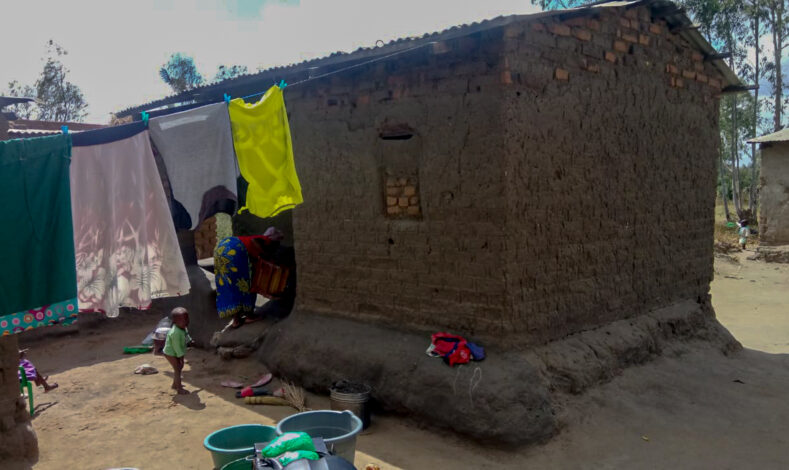
In June 2021, her mother was promised a wheelchair as she was struggling to carry her daughter on the back, to and from the hospital. The wheelchair program was postponed because Funny had an oedema and suffered from severe malnutrition. Hence, Funny was enrolled in the Outpatient Therapeutic Feeding Program where she received ready to use therapeutic food (RUTF). This brought positive results. Funny was able to support her head and neck for the first time. However, she still could not sit up and suffered from skin infections caused by the environment where she slept.
During one of her physiotherapy sessions, Stella heard about Uhuru Child Care from another mother. Although she really wanted to reach out to us, she was scared due to her past experiences with hospitals.
At the beginning of August 2022, the UCC team visited Funny’s family in Mbeta village where she lives with her mother, stepfather, and her younger sibling. The stepfather, Mr James, has accepted Funny as his own but isn’t able to fully support her as he relies on low income jobs.
We noticed that Funny was always locked inside the bedroom whenever her mother went out, because she had no one to leave her with. The team advised Stella to let Funny play outside with her friends and enjoy the morning sunlight . She has understood that Funny has a right to play with her friends and promised to continue taking good care of her child.
Willard Moyo
14/08/2022
On July 12th and August 5th 2022, Uhuru Child Care was able to visit a 16-year-old boy, Willard was born at Kasungu District Hospital. His mother quickly noticed that after birth, his left eye could…
Meet
Willard Moyo
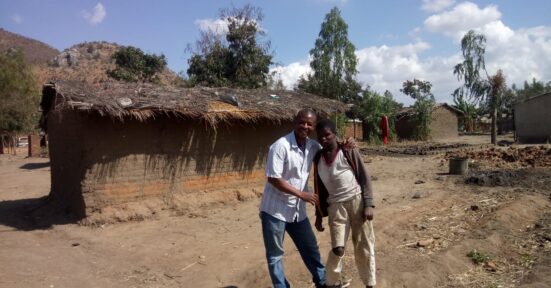
On 12th July and 05 August 2022, Uhuru Child Care was able to visit a 16-year-old boy, Willard was born at Kasungu District Hospital. His mother quickly noticed that after birth, his left eye could not open properly. Later the boy started crying continuously. The doctors realised that there were complications. There were problems with both his legs and his left eye, but they assured her that the boy would be fine as time passed.
The mother believed the doctors and she went back home with her son. One year later she realised that he was not making the usual progress made by children his age. She decided to take him back to the hospital for a check-up. Upon reaching the hospital, the doctors told her again that the child was just fine and that there was nothing wrong. The doctors continued assuring Ruth that her boy would walk in good time.
Time went by and Willard’s condition did not improve. He could not speak or hear any sound before the age of four. His mother began to worry because her son was growing older but his condition stayed the same.
Due to Willard’s condition, the father abandoned them. The mother became depressed and desperate. She stopped taking him to the hospital for check-ups. Unable to earn money and take care of him at the same time, she decided to leave him with her parents Mr and Mrs Neflida Betha. They accepted their grandson and took full responsibility for him.
Willard’s grandfather started teaching him to stand and walk. He also made him a rollator using local materials. Coached by his grandfather, Willard started to move his legs and could stand on his own. The grandfather’s efforts and Willard’s hard work paid off. Unfortunately, after two years of taking care of his grandson, the grandfather passed away. He was left with his grandmother, who was not able to take care of him in the same way as his grandfather had.
Naturally curious, Willard wanted to go to school, eager to blend in with the other children. However, because he could not talk, hear or walk properly, he was not deemed eligible for school.
When he was 7 years old, despite not going to school, Willard started developing some surprising skills. Using different materials such as aluminum, wire, and wood, he began making toy cars and other playthings. However, his talent was not valued by his family and Willard gave up and headed to Kasungu where he became a street kid.
Unable to speak, hear any sound or walk properly, made life extremely challenging. One tragic day, Willard was driving one of his toy cars on the streets of Kasungu when a speeding vehicle hit him on the main road. He was taken to the hospital but his legs were severely affected making his condition worse.
Being strong-willed, Willard the street kid managed to survive despite the obstacles he faced. He started to think about how he and his grandmother could survive. The only solution he saw was to roam the streets, begging and getting small jobs to provide his basic needs.
Time passed, members of Jehovah’s Witnesses heard about Willard and sought him out. They saw his talent and started teaching him the word of God and sign language. Willard was a good learner and he better came to terms with his life.
He continued learning God’s teachings, but he could not afford to go to school. His grandmother was too old and could not support him and herself along with three other grandchildren. Willard took on the responsibility for the whole family by whatever he earned from the streets. The grandmother now depends on him.
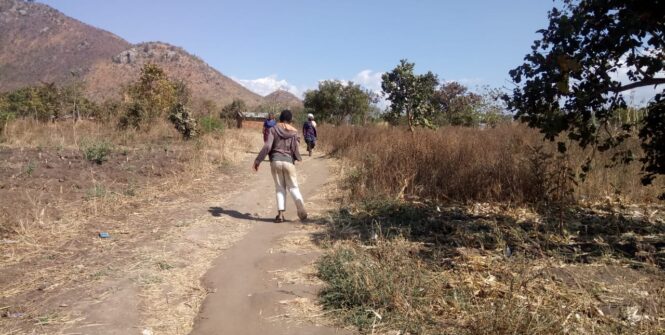
Uhuru Child Care discovered that despite being born with cerebral palsy and not able to talk, hear, or walk properly, Willard still had the vision to pursue his ambitions and his dreams.
He was dismissed as having no future, and was deprived of his rights because of his disability.
However, we believe everyone has the right to be given the chance to fulfil their dreams regardless of their disability.
UCC sees the potential in Willard Moyo. He is a bright child capable of learning a lot through training and becoming an independent person if given the opportunity.
We do understand that our country is going through a financial crisis and it is not easy for the government to support and reach every cerebral palsy child in terms of health or education support. But this should not limit children’s rights. All children deserve equal rights; the right to love, care, protection and fulfil their potential.
UCC wishes to help children born with Cerebral palsy build a future by supporting them through establishing technical schools to help them meet their potential. Also by supporting them in education, working with the government and other organisations. In doing so, we believe we can persuade parents and caregivers to stop locking up their children.
